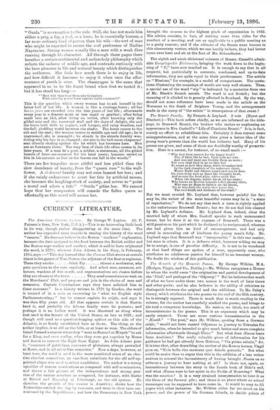The Bronte Family. By Francis A. Leyland. 2 vole. (Hurst
and Blackett.)—This book refers chiefly, as we are informed on the title- page, to Bramwell Bronte, the brother who makes so nnpleasing an appearance in Mrs. Gaskell's " Life of Charlotte Bronte." It is, in fact, mainly an effort to rehabilitate him. Certainly it does correct some misapprehensions, and at the same time gives a better idea of the young man's powers than the world has hitherto had. Many of his poems are given, and some of them are decidedly worthy of preserva- tion. Here is a sonnet, for instance, of no small merit :- " Why dost thou sorrow for the happy dead P For, if their life be lost, their toils are o'er, And woe and want can trouble them no more ; Nor ever slept they in an ea, thly bed
So sound as now they sleep, while dreamless laid In the dark chambers of the unknown shore, Whore Night and Silence guard each sealed door.
Go, turn from such as these thy drooping head. And mourn the Dead alive, whose spirit flies When life departs, before his de ith has come ; Who knows no Heaven beneath Life's gloomy skies, Who sees no Hope to lighten up the gloom, 'Tis he who feels the worm that never dies, The real death and darkness of the tomb."
But we must remind Mr. Leyland that, however painful the fact may be, the writer of the most beautiful verses may be in "a state of reprobation." We do not say that such a term is rightly applied to the unfortunate Branwell Bronte ; but we do not find him cleared by Mr. Leyland's defence. Mr. Leyland does, indeed, clear the married lady of whom Mrs. Gaskell speaks in each unmeasured terms, but he does it at the expense of Branwell. There was a wild passion on his part which he declared to be reciprocated, whereas she had given him no kind of encouragement, and had only erred in concealing out of kindness the young man's folly. Mr. Leyland says that Branwell was " irresponsible " in this one matter, but sane in others. It is a defence which, however willing we may be to accept, is one of peculiar difficulty. It is not to be wondered at that hard things are spoken of a man, apparently sane, who attributes an adulterous passion for himself to an innocent woman. We doubt the wisdom of this publication.


































 Previous page
Previous page